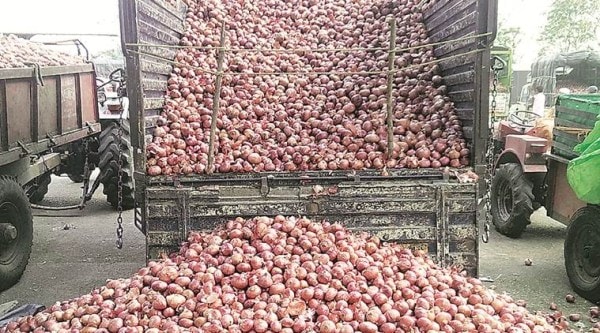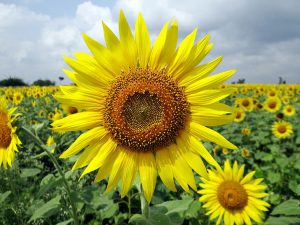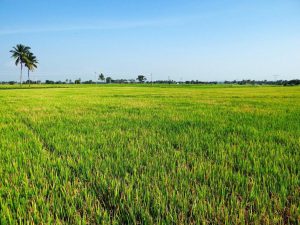Under the Merchandise Export from India Scheme (MEIS), onion exporters were eligible for a five per cent rebate for the onions they exported. However, the scheme was suspended in June 2019 due to the steady rise in retail and wholesale prices in the country The state marketing board has helped four to five traders from Lasalgaon’s wholesale market in Nashik district’s Niphad taluka to export 1,700 tonnes of onions to Bangladesh via train.
The state marketing board has helped four to five traders from Lasalgaon’s wholesale market in Nashik district’s Niphad taluka to export 1,700 tonnes of onions to Bangladesh via train.
In the wake of the daily slide in average traded price of onions in Maharashtra’s wholesale markets, the state government has written to the central government seeking the introduction of the subsidy-based export scheme for onions.
As the domestic demand slackens and exports via the road route face administrative hurdles, the state agricultural marketing board is pushing for exports to Bangladesh via the rail route.
Already, the state marketing board has helped four to five traders from Lasalgaon’s wholesale market in Nashik district’s Niphad taluka to export 1,700 tonnes of onions to Bangladesh via train.
Under the Merchandise Export from India Scheme (MEIS), onion exporters were eligible for a five per cent rebate for the onions they exported. This was done mainly to remove the glut in the market caused by excess production. However, the scheme was suspended in June 2019 due to the steady rise in retail and wholesale prices in the country. Subsequently, exports were banned in September with the country floating tenders to import onions from across the globe to cool down prices. Failure of the kharif and late kharif crop last year in Maharashtra was the main reason for this price rise.
But now, the tables have turned with the country witnessing a steady decline in wholesale onion prices. This is mostly because of a bumper rabi or summer crop, which has started arriving in markets.
Farmers in Maharashtra usually take three crops of onion depending on the season and availability of soil moisture. So, kharif (sown in June-July and harvested after September) and late kharif (sown in October-November and harvested post December-January) are grown on monsoon rains and have higher moisture content. The rabi or summer crop is grown on residual soil moisture and due to lower moisture content, is amenable to storage.
Both kharif and late kharif crops had yielded good returns for growers, which had led them to increase their rabi crop acreage. Across India, the rabi acreage as reported by the central agriculture ministry stood at 7.25 lakh hectares, compared to 5.25 lakh hectares last year.
Maharashtra has reported 4.99 lakh hectares of rabi onion, which last year was 2.67 lakh hectares. Rough estimates have pegged the onion production for 2019-20 at 245 lakh tonnes as against the national requirement of 220-225 lakh tonnes annually.
Excess production has come at a time when demand for the bulb is low due to the ongoing nationwide lockdown.
Officials said that at least 60 per cent of the onion which hits the markets is consumed by the hospitality and food processing industry. “The coronavirus crisis has put a question mark on when hotels will open. So, the country will see a glut in onion for the next few months,” stated a senior official of the state marketing department.
Senior officers of the state agriculture marketing department said that internationally, demand for Indian onions is robust in countries like Oman, Sri Lanka, Singapore and UAE. “Last year, India had exported 21.82 lakh tonnes of onion and even during the lockdown, we have seen good demand for onions” said the officer.
source: Indianexpress
Link:https://indianexpress.com/article/cities/pune/as-first-batch-of-onions-goes-to-bangladesh-by-train-maharashtra-seeks-reintroduction-of-meis-scheme-6402112/


